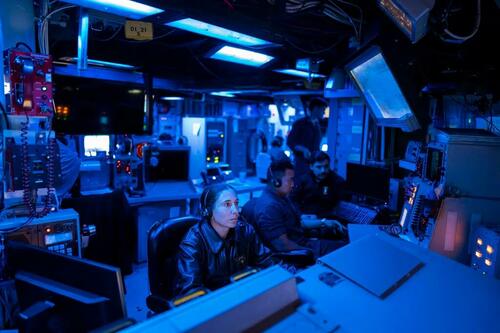
The USS Theodore Roosevelt aircraft carrier is heading back to US shores and its home of Naval Station Norfolk in Virginia after an extended Mideast tour. This brings to an end a rare Pentagon decision to have two US carrier's patrolling Middle East region waters, in the wake of soaring tensions between Israel and Iran following the Israeli assassination of Hamas leader Ismail Haniyeh in Tehran this summer.
There are still smaller US warships currently in the Eastern Mediterranean, at a moment Israel and Iran-linked Hezbollah continue daily exchanges of fire. Additionally, the USS Abraham Lincoln carrier remains in the Gulf of Oman.

The Lincoln arrived only a few weeks ago, meant to overlap with the Roosevelt before it was pulled from the theater of operations.
The USS Dwight D. Eisenhower nuclear-powered carrier had also previously been called home, following several months in the Red Sea. Yet as far as these attempts at keeping a strong 'deterrent' force in the region, the Houthis have not stopped their attacks on Red Sea shipping, though the attacks have slowed over the last several weeks.
Pentagon leaders have claimed that a carrier and warship presence near Israel has served to deter a possible major Iranian retaliation attack in response to the July 31st Haniyeh assassination.
According to fresh details of US naval movements in the Times of Israel:
US officials, who spoke on condition of anonymity to discuss troop movements, said the San Diego-based Roosevelt and the USS Daniel Inouye, a destroyer, are expected to be in the Indo-Pacific Command’s region on Thursday. The other destroyer in the strike group, the USS Russell, had already left the Middle East and has been operating in the South China Sea.
The Lincoln, which is now in the Gulf of Oman with several other warships, arrived in the Middle East about three weeks ago, allowing it to overlap with the Roosevelt until now.
Reports say that the the guided missile submarine USS Georgia is still operating in the Red Sea. The US Navy has previously acknowledged the Red Sea fight against the Houthis to be the biggest running sea battle it has faced since WW2.
Yet still, there's been no official declaration of war by Congress, and the American public has by and large ignored it. "I don’t think people really understand just kind of how deadly serious it is what we’re doing and how under threat the ships continue to be," Cmdr. Eric Blomberg with the USS Laboon described in June.
The #Pentagon’s rare move to keep two Navy aircraft carriers in the #MiddleEast over the past several weeks has now finished, as the #USS Theodore Roosevelt is heading home, according to #US officials.https://t.co/u52AFystqT
— Al Arabiya English (@AlArabiya_Eng) September 12, 2024
Iran continues to tout that it might strike Israel at any moment, and the White House has already pledged to use its regional assets to help intercept any inbound ballistic missiles or drones. Again, this comes without any Congressional war authorization or oversight whatsoever.
The USS Theodore Roosevelt aircraft carrier is heading back to US shores and its home of Naval Station Norfolk in Virginia after an extended Mideast tour. This brings to an end a rare Pentagon decision to have two US carrier’s patrolling Middle East region waters, in the wake of soaring tensions between Israel and Iran following the Israeli assassination of Hamas leader Ismail Haniyeh in Tehran this summer.
There are still smaller US warships currently in the Eastern Mediterranean, at a moment Israel and Iran-linked Hezbollah continue daily exchanges of fire. Additionally, the USS Abraham Lincoln carrier remains in the Gulf of Oman.

The Lincoln arrived only a few weeks ago, meant to overlap with the Roosevelt before it was pulled from the theater of operations.
The USS Dwight D. Eisenhower nuclear-powered carrier had also previously been called home, following several months in the Red Sea. Yet as far as these attempts at keeping a strong ‘deterrent’ force in the region, the Houthis have not stopped their attacks on Red Sea shipping, though the attacks have slowed over the last several weeks.
Pentagon leaders have claimed that a carrier and warship presence near Israel has served to deter a possible major Iranian retaliation attack in response to the July 31st Haniyeh assassination.
According to fresh details of US naval movements in the Times of Israel:
US officials, who spoke on condition of anonymity to discuss troop movements, said the San Diego-based Roosevelt and the USS Daniel Inouye, a destroyer, are expected to be in the Indo-Pacific Command’s region on Thursday. The other destroyer in the strike group, the USS Russell, had already left the Middle East and has been operating in the South China Sea.
The Lincoln, which is now in the Gulf of Oman with several other warships, arrived in the Middle East about three weeks ago, allowing it to overlap with the Roosevelt until now.
Reports say that the the guided missile submarine USS Georgia is still operating in the Red Sea. The US Navy has previously acknowledged the Red Sea fight against the Houthis to be the biggest running sea battle it has faced since WW2.
Yet still, there’s been no official declaration of war by Congress, and the American public has by and large ignored it. “I don’t think people really understand just kind of how deadly serious it is what we’re doing and how under threat the ships continue to be,” Cmdr. Eric Blomberg with the USS Laboon described in June.
The #Pentagon’s rare move to keep two Navy aircraft carriers in the #MiddleEast over the past several weeks has now finished, as the #USS Theodore Roosevelt is heading home, according to #US officials.https://t.co/u52AFystqT
— Al Arabiya English (@AlArabiya_Eng) September 12, 2024
Iran continues to tout that it might strike Israel at any moment, and the White House has already pledged to use its regional assets to help intercept any inbound ballistic missiles or drones. Again, this comes without any Congressional war authorization or oversight whatsoever.
Loading…






